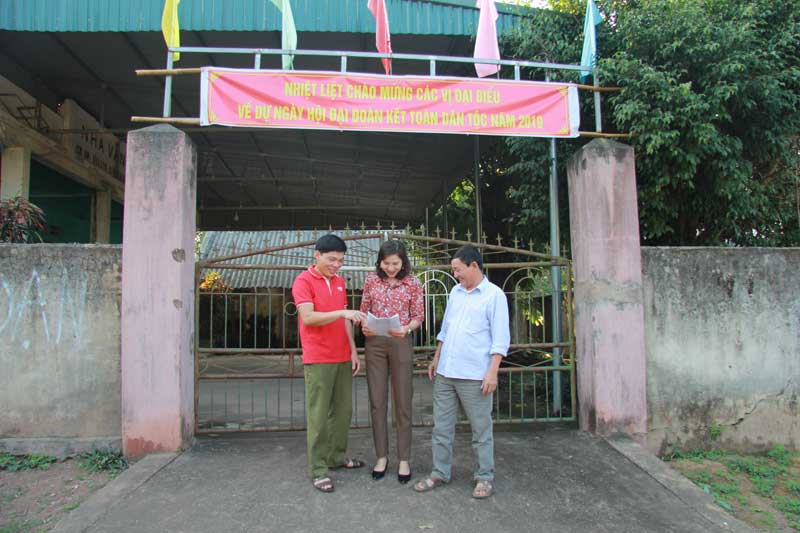
(HBO) – Three years implementing Directive 31-CT-TU issued by the HoaBinh Party Committee on the improvement of the effectiveness and quality of the building and implementation of democracy principle in localities, Lac Son district has recorded positive changes in all fields. Particularly, democracy has been promoted to create high consensus among the local community, ensuring the principles of "getting the public toknow, to discuss, to conduct and to inspect”.

Officials of Vu Binh commune in Lac Son visit locals to collect their
ideas on issues related to their legitimate rights and interests.
The efficiency ofthe processing of the questions and
recommendations given by the people has been shown in activities of directly
meeting and dialoging between local leaders with local people and enterprises.
In three years, the district has held nine direct dialogues
at the district level, one with businesses and 92 at the communal and town
levels.
The straight forward and open dialogues havehelped solve
many problems related to working policies, work safety, and allowances for
those who take part in the prevention and fight against COVID-19 pandemic.
Associating the promotion of the democracy principle with
the administrative reform, the district People’s Committee has standardised
administrative procedures, while updating and adding new procedures in
one-stop-shop offices in the district, communes and towns as well as online
portals.
Meanwhile, a modern one-stop-shop office has been launched
in Vu Ban town and Vu Binh, Tan My and ThuongCoc communes. Currently, all
communes and towns have launched inter-connected one-stop-shop mechanisms, with
103 offices processing dossiers in 11 areas, along with 254 procedures at the
district level in 14 sectors.
The citizen reception board of the district has strictly
implemented the receiving, processing administrative procedures and advising
the district People’s Committee in dealing with complaints and denunciations of
citizens.
The implementation of the democracy principle has been
manifested in the building of new-style rural areas. Dan village of Vu Binh
commune is a good example. Hoang TrongHanh, Secretary of the Party cell of Dan
village, said that the encouragement of the people to engage in the new-style
rural area building driveenjoys a lot of advantages as locals share a tradition
of solidarity without any person acting against the common interest of the
whole residential area.
Therefore, as informed of the new-style rural area building
policy, 100 percent of the Party members and locals enthusiastically supported
and took part in the work in many forms. After 10 years of building new-style
rural areas, more than 1 hectare of land has been donated by 70 households for
the construction of public works, along with the contribution of cash and
working days./.
More than just an information technology teacher, Bui Van Nien is an inspiring figure who has nurtured the scientific curiosity and creative spirit of students in Vietnam’s ethnic minority communities.
Da Bac is the most disadvantaged mountainous district in Hoa Binh province, with ethnic minorities accounting for about 90% of its population. Over the past years, the district has mobilised resources to implement ethnic policies to improve the quality of life of local people.
In recent years, Hoa Binh province has consistently prioritised the protection, care, and education of children, particularly those from ethnic minorities and disadvantaged backgrounds, by creating a safe, healthy, and nurturing environment for their all-round development.
The Steering Committee for Tobacco Harm Prevention and Control of Hoa Binh province, in coordination with the Tobacco Harm Prevention and Control Fund, held a ceremony on May 28 in response to the World No Tobacco Day (May 31) and the National No Tobacco Week (from May 25 to 31). The event was chaired by Nguyen Van Toan, Standing Vice Chairman of the provincial People’s Committee and head of the Steering Committee.
Since 2021, the Center for Industrial Promotion and Industrial Development Consulting (CIIDC) under the Department of Industry and Trade has been implementing a school lighting model as part of the plan for using energy efficiently and economically in Hoa Binh Province in the pẻiod of 2021 - 2025. This model not only aims to improve the learning conditions and enhance the education quality, but it also promotes the message of energy saving, energy security, environmental protection and contributes to the goals of socio-economic development.
In the 2024 - 2025 school year, the entire Hoa Binh provincial education sector includes 520 educational institutions and schools. Among them are 13 ethnic boarding schools with 153 classes and 4,487 students. Four of these schools have met national standards, reaching 30.7 percent.



